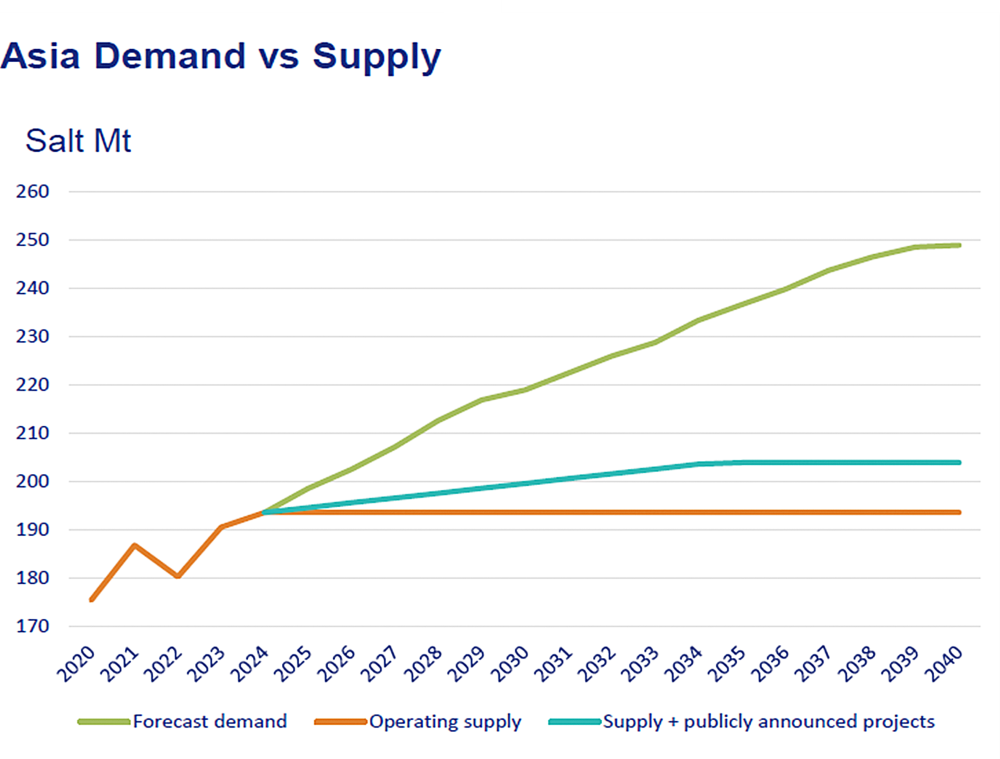How adding salt to our portfolio is creating long-term value
Long-term value investing always makes sense and has been hugely rewarding for investors, but when momentum is driving markets and growth stocks continue to climb higher, it can be difficult to maintain a value lens, which is why a clear investment philosophy and disciplined approach is crucial.
As a high conviction, value manager, Ryder Capital is looking for undiscovered and overlooked gems where the upside far outweighs the downside. Identifying opportunities early, before the rest of the market catches on, can lead to outsized long-term returns. BCI Minerals (BCI) is a case in point. We see an incredible opportunity that remains overlooked due to the market’s obsessive short-term focus. At current prices, this stock is offering a potential 33% fully franked future dividend yield for 60+ years with an unlimited resource supporting its annuity-like income.
BCI is the 100% owner of the Mardie Salt and Sulphate of Potash (SOP) project which will be Australia’s largest salt project and the third largest globally. Assets such as this project are typically not accessible on the ASX or other listed markets, usually they would be privately owned or sitting within large mining companies such as a BHP, Rio Tinto or large Asian trading conglomerates, making BCI a rare and unique opportunity for investors.
Ryder currently owns 10% of the company and has been a shareholder in BCI for over eight years, supporting the company from its days as an iron ore asset owner through to the development and construction of the Mardie project. The journey of delivering this project has been a difficult and painful exercise for shareholders, with a material cost escalation in the aftermath of COVID-19 leading to project delays and ultimately the need for additional debt, equity and a new management team. This near-death experience in 2023, has left BCI friendless in the market, supported by a group of loyal, patient shareholders, including the Stokes family and Australian Super, alongside Ryder Capital.
We are now on the other side of these challenges and the investment proposition has never been better with a high-quality management team, funding, approvals and offtake agreements in place as well as upside from additional earnings streams.
BCI is now significantly de-risked and reaching a critical inflexion point as it approaches first salt on ship and revenues at the end of next calendar year.
This is a clear case of the market falling into the trap of grossly overestimating the shorter-term issues while underestimating the very attractive longer-term returns that this project will generate for shareholders.
Why salt?
Salt is an industrial mineral used in the manufacturing of thousands of products including glass, plastics, paint, aluminum, and solar panels to name a few. Due to its wide use across many industries, salt demand has historically had a very high correlation to GDP growth with significantly less price volatility than many other commodities. The location of the Mardie project positions BCI to benefit from growth in Asia, as the Asian economy continues to accelerate, the demand for salt in this region will continue to increase.
Meanwhile on the supply side, whilst salt is in abundance on earth, producing high purity industrial grade salt, at scale, and delivering it to customers efficiently and consistently is not easy. As our experience with BCI has proven, these large-scale projects take many years to develop, with a significant upfront capital requirement (~$2bn in the case of Mardie) and a long list of approvals, including some very onerous environmental hurdles.
Salt projects are not easily established in Australia and Mardie will be the first new salt project in Australia in close to 30 years.
A steady increase in global demand for salt led by increasing Asian demand, combined with a lack of new projects in the pipeline, support industry forecasts of a future supply deficit in the salt market (see chart below), providing a strong price backdrop for salt. Although not currently reflected in any forecasts, recent advances in the development and commercialisation of sodium-ion batteries could lead to an additional, meaningful increase in salt demand. Ultimately the investment thesis does not rely on a higher salt price, this simply provides further upside.

The exciting part
The Mardie project is vast, covering over 100km2 of coastal land, ideally located 100km south of Karratha in WA, in one of the best regions globally to produce salt by solar evaporation due to its low humidity, long sunny days and low average rainfall. Being relatively close to customers in Asia creates a strong competitive advantage and with the Mardie project forecast to be the third-lowest cost producer globally, the project will be highly profitable, generating a significant amount of free cash flow over its 60+ year life.
At full production of 5.35Mtpa of salt and 140ktpa of SOP, BCI will be generating ~$400m of EBITDA, noting SOP production represents ~25% of earnings. Whilst progressing well, this part of the project is still in its early stages of development with a pilot plant currently in design phase and expected to commence construction later this calendar year. With such a significant upfront capital outlay, there is very little sustaining capital expenditure required for this project, which we estimate to be as low as $15-$20m p.a., underwriting strong free cash flow generation.
There is substantial inherent value in BCI’s infrastructure, in particular the Cape Preston West Port, which is 100% owned and operated by BCI, in which they have invested $350m. This is a multi-user port with a purpose-built 2.4km jetty (pictured below) that can support export capacity of 20Mt p.a., leaving 14.5Mt surplus capacity available to generate an additional high margin earnings stream for BCI. Market tolling rates support an incremental EBITDA of up to ~$90m if all capacity is used and although this will require an incremental investment, the profits generated will drive a quick payback period.
If we assume an incremental $60m EBITDA earned from the port assets, BCI would be earning $460m EBITDA at full project ramp up (including SOP earnings) while only spending $20m on maintenance capex, leaving ~$310m of after-tax free cash flow available for debt servicing/repayments or to distribute to shareholders. Total debt will be repaid by 2035, balanced with dividends along the way. Assuming debt is repaid/refinanced leaves ~10c per share available to be paid as a fully franked dividend, providing investors today with the prospect of a future 33% fully franked yield p.a, indexed and growing for over 60 years. From a capital growth perspective, BCI should trade at 15x free cash flow, implying a share price of $1.45, a 5x return from the current share price of $0.29.
With the recent receipt of environmental approval from the Commonwealth Government to progress to full scale operations, the Mardie project is now fully permitted, fully funded and well on its way to first revenues, we think it's time the market did the work on BCI Minerals.
This article was co-authored by Peter Constable (Founder and Chairman of Ryder Capital)
3 topics
1 stock mentioned

